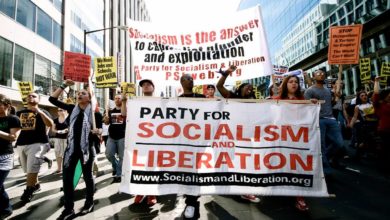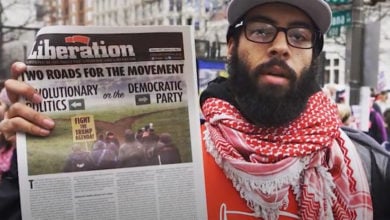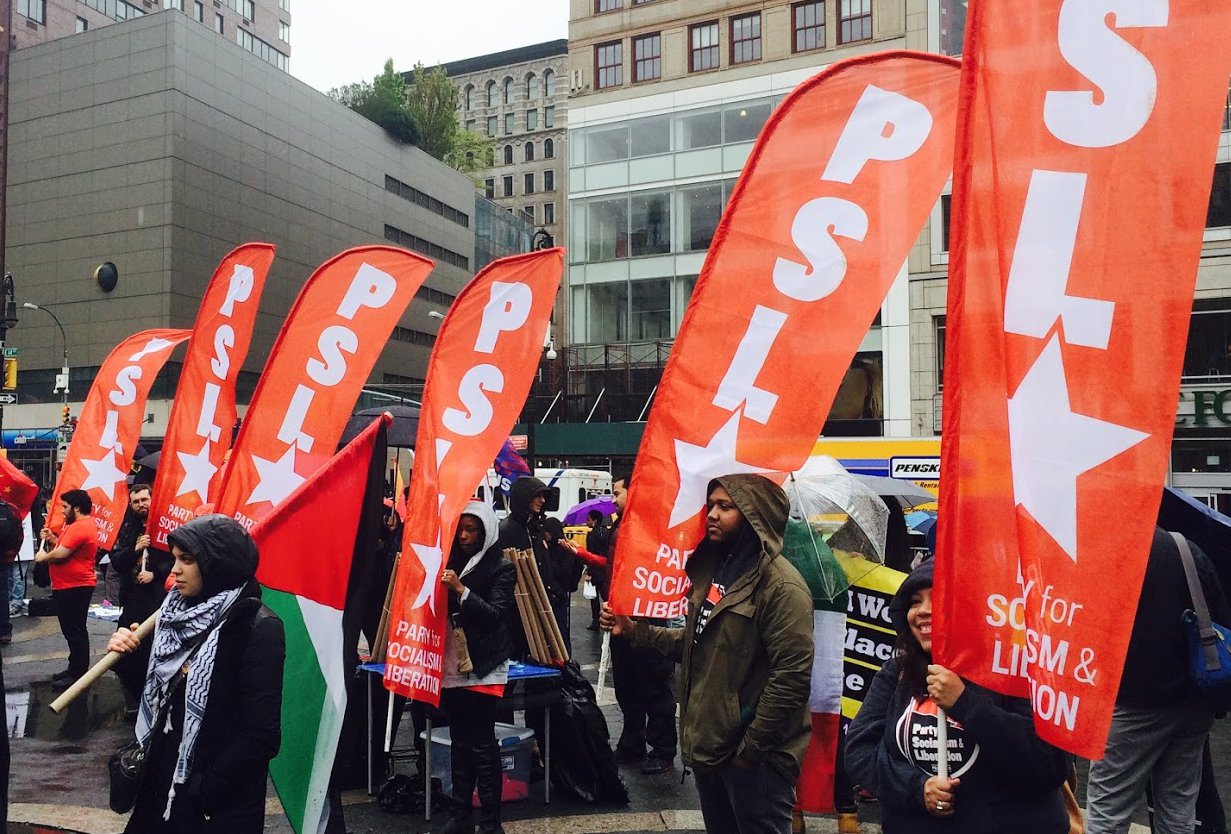Following is a talk
given in a panel titled “Socialism and the Latin American revolution” at the
Nov. 13-14, 2010, National Conference on Socialism sponsored by the Party for
Socialism and Liberation.
In the past 10 years, there has been a profound political
shift in Latin America. The emergence of new progressive, revolutionary and
socialist movements alongside socialist Cuba and the struggle in Colombia
against the brutal U.S.-backed right-wing government is posing a growing
challenge to U.S. dominance in the region.
The new movements have arisen in response to decades of
brutal oppression sponsored by U.S. imperialism and a neo-liberal economic
offensive meant to bring Latin America firmly under the grip of Wall Street.
The list of U.S. aggressions in the region is very long and
goes back to the early 19th century. The list includes virtually
every country in the region and any country that shows even the slightest bit
of independence has become a target of U.S. destabilization and intervention.
U.S.-backed coups and assassinations, U.S.-trained death
squads, U.S.-backed dictators and all kinds of subversions were and are part of
a wider strategy to protect and promote U.S. business interests in the region
and to destroy independence movements and leftist movements that dare to
struggle against Washington’s dictates. The list of rebellions and revolutions
in Latin America against imperialism and local elites is also very long.
In the 1970s, the U.S. government helped overthrow the
socialist government of Chile and helped unleash a reign of terror in Latin
America against progressive and revolutionary movements.
With the weakening and collapse of the Soviet Union in the
late 1980s, Washington attempted to strengthen its control over the region.
Among many other interventions, in 1989, the U.S. invaded Panama in a brutal
midnight attack that killed 4,000 civilians and destroyed the Panamanian
military. The attack assured that the U.S. military would remain in control of
the Panama Canal, a vital point of trade in the Americas.
At the same time, U.S. imperialism has sought greater
dominance over Latin American economies by enforcing destructive and lopsided
free trade policies, including NAFTA. While the “neo-liberal”
policies have greatly enriched the imperialist corporations and the more
compliant national bourgeoisies, they have spelled disaster for the masses. Across
the region, Wall Street’s plundering deepened the already unbearable levels of
poverty, drove millions off their land, caused a deterioration of social
conditions and brought about a wave of economic crises and collapse.
The new anti-imperialist, anti-free trade and independence
movements have different histories, different concrete circumstances to deal
with, and different approaches or “trends.” But they all share the general
characteristic of uniting to fight for economic and political independence. In
recent years, Latin American countries have joined ranks to defeat free trade
agreements, denounce the U.S.-backed coups in Honduras and Ecuador, and oppose
Colombian aggression.
The new wave of anti-imperialism has been ushered onto the
world stage by the struggles and organizing of workers and the poor across the
region, from the bottom of society up. From Mexico to Argentina, the decade has
seen numerous mass strikes, land occupations, rebellions, mass movements
against privatizations, factory occupations, street battles, electoral battles
and more.
In an event that shook the region and the world in April
2002, the masses poured out into the streets and, with the help of loyal
sections of the military, overturned a U.S.-sponsored coup of Hugo Chavez. The
defeat of the coup provided the spark to much of the “leftward shift” in Latin
America.
One trend in Latin America, exemplified by Brazil and
Argentina, is for greater independence for Latin America within the
U.S-dominated economic system.
Another trend, exemplified by Venezuela, Cuba, Bolivia,
Nicaragua and Ecuador, is openly defying U.S. imperialism, and has formed the
Bolivarian Alternative for the Americas, a Latin American economic bloc that is
fostering greater economic development based on cooperation and the elevation
of the region’s workers, poor and indigenous. ALBA
has formed in direct response to the so-called “free trade” agreements imposed
by U.S. imperialism in Latin America. The economic bloc has provided financing
for health care, housing, infrastructure and national economic development in
all member nations.
In the case of Cuba, their 1959 revolution drove U.S.
imperialism out, and their socialist system, which has instituted collective
ownership and a planned economy and has done away with national elites, has
provided the basis to develop independently of the United States and to greatly
raise the living standards for all Cubans. Cuba has played an indispensable
role in the region’s progressive advance, providing health care and literacy
programs across the region.
Venezuela and Bolivia have both nationalized important
industries and instituted economic and social programs that are greatly
improving the lives of the masses. In Venezuela and Bolivia, the state and
growing sectors of the economy are in the hands of the people. Venezuela, a
nation of great potential wealth, has continued to make important strides on
its road to socialism and has been crucial to the new wave of economic
independence and regional solidarity by trading on very favorable terms with
other nations in the region. Venezuela for example, has written off Haiti’s
debt.
Dangers to the revolutionary process in Venezuela and the
rest of Latin America are many, including constant counter-revolutionary
attacks and threats organized and sponsored by U.S. imperialism. The United
States spends billions of dollars a year supporting elite and right-wing forces
in Latin America. Under the Obama administration, the Pentagon has created five
new military bases in Colombia, Venezuela’s neighbor. The United States has
reactivated the 4th fleet to patrol and menace the waters off Latin
America. The elites of both countries also pose a very real threat. Much of the
wealth of both countries is still property of a counter-revolutionary oligarchy
who seek to use that wealth not for the benefit of the country, but for their
own interests.
Right-wing governments like the ones in Colombia and Peru
also pose a real danger to the peoples of the region.
Though they are not members of the anti-imperialist ALBA and
though they are not pursuing many of the revolutionary social and economic
policies that Venezuela is, Brazil and Argentina have resisted all attempts of
the United States to force them to break their solidarity with Venezuela, Bolivia
and the general movement for independence in Latin America. They have also
stood firm in their call for the United States to lift the blockade of Cuba.
This solidarity is very important for the people’s struggle against U.S.
domination.
Brazil’s robust economic development and its growing trade
in the region is also very important for Latin America, as is the growing trade
between Latin America and countries like China and Iran. In order to realize
their independence, Latin America will only be aided by the cooperation and
solidarity of an international community that is seeking to develop
independently of U.S. imperialism.
The recent advances in Latin America are very important for
workers, progressives and revolutionaries here in the United States. They are
not remote events and we should not be impartial observers. The revolutionary
tide surging in Latin America exposes the weaknesses and abusive nature of U.S.
imperialism.
It must be clearly noted, however, that Washington and local
elites will never respect elections that yield results opposite of their
interest and they will never stop pursuing greater economic gain for
themselves. In the upcoming months and years, it will be the masses themselves
and the class struggle in Latin America and beyond that will determine the
outcome of the struggle against imperialism and capitalism in Latin America.
We must exert every effort to build solidarity with the
people and progressive governments in Latin America as they are making gains in
their important struggle for independence. Their gains are our gains too.
Contrary to prevailing wisdom in Washington and in the media, the free trade
policies and economic dominance of Wall Street in Latin America are major
direct contributors to lower wages and an the explosion of poverty here in the United
States. Our common enemy in the struggle for justice, jobs, equality,
liberation and socialism are U.S. imperialism, Wall Street, and the capitalist
system of exploitation and plunder. The more determined our worldwide struggle,
the greater our unity, the better our future will be.
U.S. hands off Latin America!




